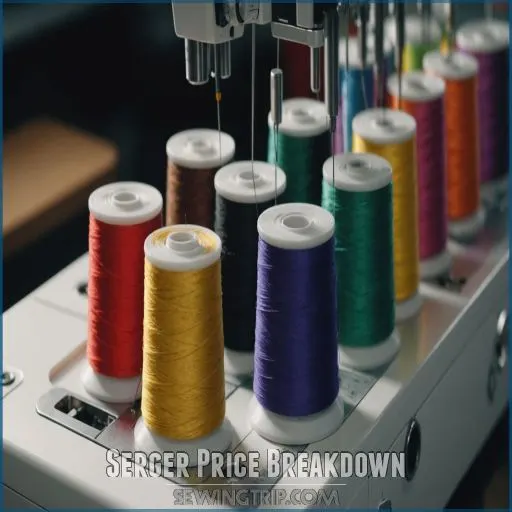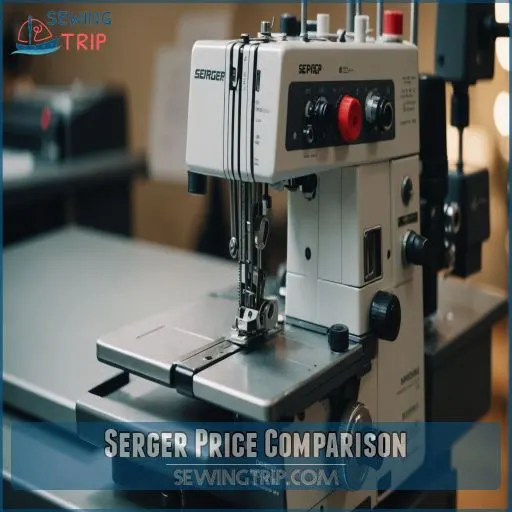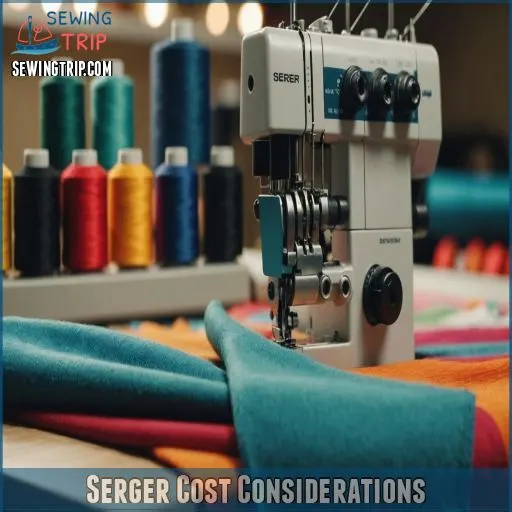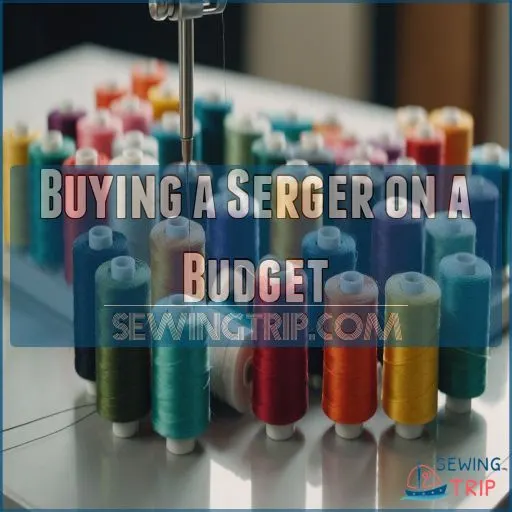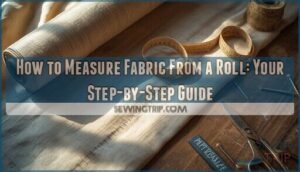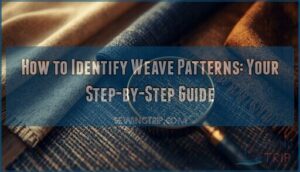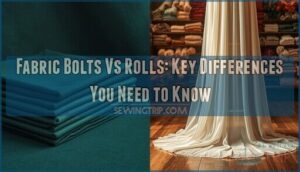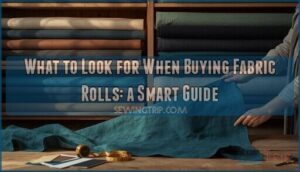This site is supported by our readers. We may earn a commission, at no cost to you, if you purchase through links.
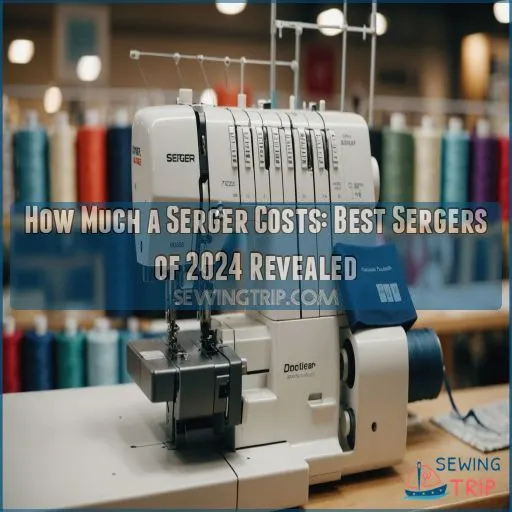
Entry-level sergers start around $200, perfect for curious beginners dipping their toes into professional-looking seams. Mid-range models, packed with more features, typically fall between $500 and $1,500.
If you’re feeling fancy (or have a lottery win to spend), high-end sergers can soar up to $8,000! But don’t let sticker shock scare you off – there’s a serger for every budget and skill level.
The price tag often reflects the bells and whistles, like automatic threading or specialty stitches. Ready to unravel the mystery of serger pricing?
Table Of Contents
- Key Takeaways
- Serger Price Breakdown
- Serger Price Comparison
- Top 9 Best Serger Machines
- 1. Bernette 64 Airlock Air Threading Serger
- 2. Juki MO654DE Portable Serger
- 3. Brother Coverstitch Serger 2340CV
- 4. Singer Heavy Duty Serger Overlock Machine
- 5. Brother Serger Metal Frame Overlock Machine
- 6. SINGER Finishing Touch Serger Sewing Machine
- 7. Juki MO 50E Serger
- 8. JUKI MO644D Portable Serger
- 9. Janome 8002D Serger Bonus Accessories
- Serger Cost Considerations
- Buying a Serger on a Budget
- Frequently Asked Questions (FAQs)
- Conclusion
Key Takeaways
- You’ll find sergers across a wide price range, from budget-friendly options around $200 to high-end machines that can set you back $8,000. It’s like shopping for a car – there’s something for every budget and skill level.
- Don’t let sticker shock scare you off. Entry-level sergers, like the popular Brother 1034D, which costs about $225, can be a great way to dip your toes into the world of professional-looking seams without breaking the bank.
- Remember, the price often reflects the bells and whistles. Features like automatic threading or specialty stitches can bump up the cost, but they might be worth it if you plan to use your serger frequently.
- When budgeting for your serger, don’t forget to factor in ongoing costs. Thread, maintenance, and energy consumption can add up over time. It’s like adopting a pet – the initial cost is just the beginning of your serging journey.
Serger Price Breakdown
If you’re sewing’s biggest fan and thinking about getting a serger, you’re likely wondering what influences their prices.
From brand reputation to flashy extras, understanding serger costs can help you avoid spending your fabric fund on needles alone—or, worse, on a machine that gathers dust!
Factors Affecting Serger Costs
Choosing a serger is like finding the perfect dance partner: balance speed, finesse, and features.
Key factors affecting serger costs include machine type (home or industrial), brand popularity (Brother, Juki), and added features like digital screens.
Consider thread quality and warranty duration too.
Whether new or pre-owned, your serger can be a trusty companion in creative endeavors, offering balance of speed, and finesse (Source).
Price Range of Different Serger Models
Whether you’re diving into budget sergers or eyeing high-end brands, each model has a unique charm.
The entry-level Brother serger offers affordability and ease for beginners, perfect for mastering the basics.
Mid-range options like the JUKI provide reliable performance for passionate hobbyists.
If you crave professional-grade features, explore Baby Lock’s intricate cover stitch magic!
Brand Reputation and Pricing
With sergers, brand reputation and pricing often go hand-in-hand.
While premium brands like Babylock and Juki may cost more upfront, their durable construction and professional-grade stitching make them a worthwhile investment.
On the other hand, entry-level options from Brother or Singer can provide excellent value for money, representing a more budget-friendly alternative with professional-grade stitching not always available.
Additional Features and Accessories
With brands offering unique features, your serger’s accessories can easily set it apart.
Look for serger feet that can handle every task, adjustable thread tension for those finicky fabrics, and serger tools that’ll keep you rolling without a hitch.
Picture a serger case safeguarding the mighty machine and serger threading that’s a breeze—like threading a needle in daylight!
New Vs Refurbished Sergers
Buying a serger is like choosing between a shiny new car or a dependable pre-owned one.
New sergers often come wrapped in a warranty, promising reliability and modern features.
Refurbished sergers, however, can provide great value if you’re willing to accept a little risk for a lower cost.
Both options help you master the art of overlocking.
Serger Price Comparison
When you’re shopping for a serger, understanding the price differences across brands like Brother, Baby Lock, and Juki can make all the difference in finding the perfect balance between cost and features.
Let’s explore the cost variations among popular serger models to help you stitch up a smarter purchase.
Brother Serger Prices
Brother serger models are budget-friendly gems for your sewing toolkit, offering impressive features like color-coded threading and easy tension controls.
These machines are perfect for those aiming for professional finishes without breaking the bank.
You can find models starting around $200, making them great for both newbies and seasoned sewers seeking precision and reliability.
Baby Lock Serger Prices
Curious about Baby Lock serger prices? It’s like shopping for the Swiss Army knife of sewing machines!
Prices range from $649 for the versatile Victory model to $3,499 for the top-tier Triumph.
These machines boast features like no-tension adjustments and automatic threading.
Plus, buying from authorized dealers makes sure you get great warranty and support.
Juki Serger Prices
Juki sergers offer excellent value for both beginners and pros seeking variety and dependability. Whether you’re crafting clothes or home decor, these machines stand out.
Here’s why Juki sergers are endlessly praised:
- Prices around $399 to $599
- Durable components from industrial designs
- Features like differential feed and adjustable tension
- Model options like MO654DE, perfect for versatile sewing tasks .
Janome Serger Prices
When comparing Janome serger prices to others like Juki, you’ll find a range of fantastic machines.
With dealer discounts and accessory bundles, Janome sergers offer speed and reliable finishing—worth considering for your sewing adventures!
Check out the Air Thread AT2000D, priced online at $1,249.00, or the more accessible Magnolia 7034D at $269.00.
| Model | Online Price |
|---|---|
| AT2000D Air Thread | $1,249.00 |
| CoverPro 2000CPX | $899.00 |
| Magnolia 7034D | $269.00 |
| Pro4DX | $539.00 |
Singer Serger Prices
While Janome sergers catch your eye with versatility, Singer serger price trends capture the imagination of budget-savvy crafters.
With practical features like cover stitch sewing, you’ll find competitive prices and enticing Singer serger bundles.
Plus, the warranty provides peace of mind.
Explore Singer serger reviews to uncover models that won’t unravel your wallet—perfect for your next sewing adventure and richer projects!
Top 9 Best Serger Machines
If you’re on the hunt for a serger that fits your sewing needs and budget, check out our list of the top 9 best serger machines of 2024.
From beginner-friendly models to feature-rich options for advanced users, these machines offer great stitching speed and versatility.
Making them a fantastic addition to any sewing room.
1. Bernette 64 Airlock Air Threading Serger
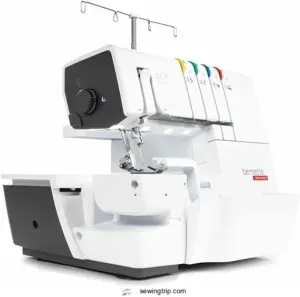
Curious about the Bernette 64 Airlock? This mid-range serger comes with handy air threading, making setup a breeze.
With features like a free arm, knee lifter, and micro adjustments, it’s a tool that lets you craft with precision.
However, watch out for noise and occasional air threading hiccups.
The machine offers bright LED lighting and a stitch speed of up to 1,300 per minute.
If you’re thinking about trying serging, this versatile machine could be your ticket to trying serging .
Best For: The Bernette 64 Airlock is best for sewers who want a mid-range priced serger with air threading and a variety of features.
- Automatic air threading for loopers makes setup easy.
- Free arm and knee lifter offer versatile sewing possibilities.
- Micro thread control allows for precise adjustments.
- The machine can be noisy.
- Some users have reported issues with the air threading feature.
- The quality may not be as high as other brands.
2. Juki MO654DE Portable Serger
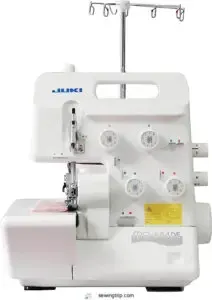
Looking to master your sewing projects? The Juki MO654DE Portable Serger might just be your new best friend.
This serger offers reliable overlock stitching, perfect for tackling both delicate fabrics and heavy materials, thanks to its robust knife system and differential feed.
It’s user-friendly with intuitive color-coded threading, making setup a breeze even if you’re an overlocking newbie.
Although it doesn’t include a coverstitch function, its powerful performance and ease of use make it a top choice for many sewing enthusiasts.
Best For: The Juki MO654DE Portable Serger is best for sewers who want a reliable and user-friendly serger for overlock stitching on a range of fabrics.
- Reliable overlock stitching for both delicate and heavy fabrics.
- User-friendly threading with color-coded guides.
- Powerful performance and ease of use.
- Doesn’t include a coverstitch function.
- No built-in LED light.
- User manual may not cover all stitch types.
3. Brother Coverstitch Serger 2340CV
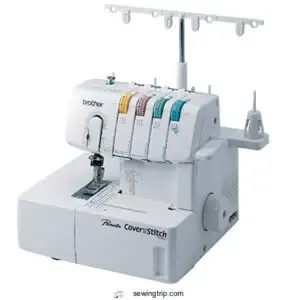
The Brother Coverstitch Serger 2340CV is a budget-friendly choice for sewing enthusiasts excited to conquer professional hems. This machine offers excellent stitch quality when settings align with materials.
Threading’s a breeze, making it user-friendly even for beginners .
Though lacking refined features like a thread cutter or LED lights, it’s ideal for those focusing on durable, stretchy hems.
Its sturdy metal build means it can handle most projects, provided you don’t push it beyond thick seams, making it a great option for those looking for a budget-friendly machine.
Best For: The Brother Coverstitch Serger 2340CV is best for sewers who want a sturdy, budget-friendly machine for creating professional hems and durable seams on stretch fabrics.
- Easy to thread, even for beginners.
- Durable metal construction for long-lasting use.
- Offers a range of cover stitch options for versatile projects.
- Tension release can be tricky to adjust.
- Occasional skipping in 3-thread cover hem may require re-threading.
- Lacks auto-threading and LED lights.
4. Singer Heavy Duty Serger Overlock Machine
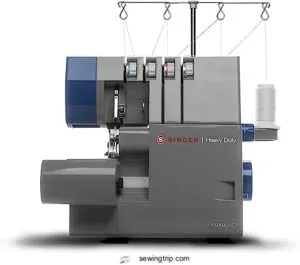
You’ll find that the Singer Heavy Duty Serger Overlock Machine is a reliable, sturdy companion in your sewing journey.
Its metal frame and high-speed stitching make it perfect for tackling tough materials with ease.
You’ll appreciate the color-coded threading system—it’s like having a GPS for your spools!
While it may not offer luxury features, its speed and durability are real crowd-pleasers.
Whether you’re wrestling with upholstery or sewing up chic outerwear, this serger’s got your back with style and grit.
Best For: This serger is best for crafters and sewers who need a sturdy, high-speed machine for handling heavier fabrics.
- Heavy-duty construction makes it ideal for thicker materials.
- Color-coded threading system simplifies the threading process.
- Fast stitching speed allows for efficient work.
- Threading can be challenging for beginners.
- The plastic housing may feel cheap to some users.
- Blade replacement can be difficult due to the small screw.
5. Brother Serger Metal Frame Overlock Machine
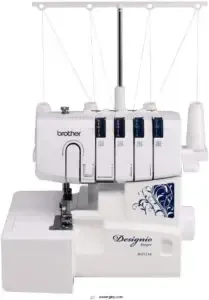
Brother’s DZ1234 serger is a handy gizmo for sewing enthusiasts seeking efficiency and that professional flair.
With a robust metal frame and 3-4 thread versatility, it tackles projects with gusto, stitching up to 1,300 stitches per minute.
Its easy threading, thanks to color-coded guides, lets you hit the ground running.
Stitch width is adjustable between 3mm and 7mm, ensuring your seams and hems are tailor-fit.
Though it can sound like a small jet engine, this machine’s speed and precision make it a worthwhile companion.
Best For: This serger is best for beginner sewers looking for a durable and versatile machine to speed up their projects.
- Durable Metal Frame: Built to last, this machine can handle a variety of projects.
- Easy Threading: Color-coded guides and numbered loopers make threading a breeze, even for beginners.
- Fast Stitching: With speeds of up to 1,300 stitches per minute, this serger can save you time on your projects.
- Limited Speed Control: The lack of precise speed control can make it challenging for some projects.
- Basic Manual: The manual is not as comprehensive as some other sewing machine manuals, which could be frustrating for some users.
- Thread Quality: The included thread can be prone to breaking, so you may want to use a higher quality thread.
6. SINGER Finishing Touch Serger Sewing Machine
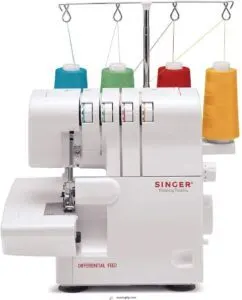
Imagine having a sewing sidekick ready to tackle your fabric challenges—enter the Singer Finishing Touch Serger.
With its 4-3 thread capability and speedy 1,300 stitches per minute, it’s got the muscle for neat, professional seams on both light and medium fabrics.
The color-coded threading makes setup a breeze, but handling heavier fabrics? That might need a bit more finesse.
This machine’s sturdy frame provides stability while its built-in free arm takes care of those tricky cuffs.
It’s perfect for anyone ready to step up their sewing game (Source).
Best For: The Singer Finishing Touch Serger is best for beginner to intermediate sewers looking to add a professional touch to their projects.
- 4-3 thread capability for versatile stitching options.
- Color-coded threading for easy setup.
- Free arm for convenient sewing of cuffs and other tricky areas.
- May require some trial and error to achieve optimal tension settings.
- Can be noisy even after oiling.
- May experience thread tangling during shipping.
7. Juki MO 50E Serger
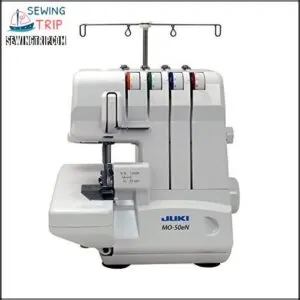
The Juki MO 50E Serger is like mastering a new dance—initially tricky, but rewarding once you get the hang of it.
With features like three or four thread capabilities, an automatic lower looper threader, and adjustable differential feed, it’s designed to impress.
You’ll enjoy smooth, quiet operation, though threading might need a little practice.
At an affordable price, it’s a fantastic option for beginners who are interested in trying out serging without breaking the bank.
Ready to serge away?
Best For: The Juki MO 50E Serger is best for beginners who want to explore serging without a huge investment.
- Easy threading (once you get the hang of it)
- Quiet operation
- Affordable price
- Some initial difficulty with threading
- One user reported a breakdown after three months of use
- Limited lighting could make threading challenging
8. JUKI MO644D Portable Serger
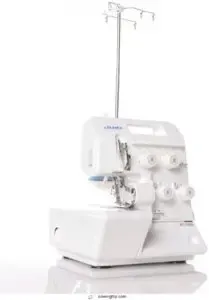
Get into the world of sewing mastery with the JUKI MO644D portable serger! This machine isn’t just a tool; it’s like having a sewing partner who never complains.
With 2/3/4 thread options, you’ll get versatility in seam finishes. Its color-coded threading helps turn a usually tricky process into a piece of cake.
Whether you’re crafting with knits or wovens, the differential feed makes sure of smooth seams every time . Although adjusting the cutting width can be fiddly, this serger remains a reliable ally.
Best For: This serger is perfect for sewers who want a reliable machine for light to medium weight fabrics, especially stretchy materials.
- Quiet and smooth operation makes for a pleasant sewing experience.
- Color-coded threading system simplifies the process.
- Differential feed ensures professional-looking seams.
- Manual may be difficult to understand due to translation issues.
- Lightweight foot pedal can move around during use.
- Produces a significant amount of fibers, requiring a collection method.
9. Janome 8002D Serger Bonus Accessories
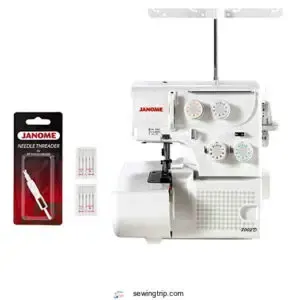
Ever felt like your sewing projects are missing that polished touch?
Enter the Janome 8002D Serger. This machine isn’t just a serger; it’s your sewing sidekick.
With a 3 and 4-thread convertible system, it offers professional seams at an unbeatable value.
Equipped with snap-on presser feet and adjustable foot pressure, it’s as versatile as your sewing imagination.
Plus, it comes with handy accessories like serger needles and screwdrivers.
Get ready for endless creativity and smooth, effortless serging at your fingertips!
Best For: The Janome 8002D Serger is perfect for beginners and those who want a reliable, easy-to-use serger for various sewing projects.
- Comes with a variety of accessories, including a blind stitch foot, serger needles, and screwdrivers.
- Compact and lightweight, making it easy to store and move around.
- Offers professional-looking seams with a 3 and 4-thread convertible system.
- Some users find it difficult to thread at first.
- May experience thread breakage.
- Doesn’t come with a carrying case.
Serger Cost Considerations
When purchasing a serger, it’s essential to think about the ongoing costs beyond just the initial machine price.
From thread expenses to maintenance needs, understanding the full scope of serger ownership can help you budget accordingly and make the most informed buying decision.
Thread Costs and Availability
When serging, choosing the right thread can make a world of difference. Here’s a handy guide:
- Thread Quality: Invest in durable, high-quality threads so your stitches don’t unravel unexpectedly. For instance, serger thread is often finer and less strong than regular sewing thread, so you need to choose a high-quality option that can handle your project’s demands. Consider the serger thread compatibility when selecting your threads.
- Bulk Thread Deals: Save money by buying threads in bulk online. This is especially beneficial for bulk projects where finesse isn’t a priority, as serger thread can be a cost-effective option.
- Local Suppliers: Check local stores for deals or rare colors to complete your collection.
Maintenance and Repair Costs
You’ve invested in a serger, but don’t forget about the upkeep! Regular maintenance is key to keeping your machine humming along.
While basic cleaning can be a DIY job, professional servicing is recommended every year or two .
Costs vary, but expect to shell out $70-$150 for mechanical sergers and up to $250 for computerized models.
Remember, a stitch in time saves nine – and your wallet, which is why regular maintenance is an important part of owning a serger, helping to prevent costly repairs down the line, which will save you and your wallet!
Energy Consumption and Operating Costs
Many serger owners overlook the impact of energy consumption on their sewing costs.
Your serger’s power usage can vary quite a bit, with some models consuming up to 120 watts.
By choosing an energy-efficient serger and adopting smart usage habits, you could save up to $0.53 per year.
Consider unplugging your machine when not in use and leveraging natural light to further reduce your carbon footprint and electricity bill.
Space and Storage Requirements
Finding the perfect spot for your serger can be like solving a puzzle. You’ll want to think about:
- Dimensions: Typically 16" L x 15" H x 14" D
- Foldability: Many collapse to just 3" for easy storage
- Portability: Look for wheeled options for classes or retreats
- Workspace needs: Some tables offer 43-53" of width
- Multi-use potential: Consider adjustable height tables that double as office desks
Remember, a well-organized sewing space is your ticket to serging bliss!
Accessories and Additional Features
How much should you budget for serger accessories? While your serger might come with basic feet, investing in specialty attachments can open up a world of creativity.
From blindstitch feet for invisible hems to beading feet for embellishments, these add-ons can take your projects to the next level.
Don’t forget about maintenance kits and high-quality threads – they’re the unsung heroes of smooth serging!
Buying a Serger on a Budget
If you’re dreaming of serging but your wallet’s feeling the pinch, don’t worry – there are plenty of ways to snag a serger without breaking the bank.
From budget-friendly models to savvy shopping strategies, we’ll show you how to join the serger club.
Without emptying your piggy bank.
Affordable Serger Options
With a bit of savvy shopping, you can snag a great serger without breaking the bank.
- Brother 1034D: A popular workhorse for under $300
- Janome 634D: A reliable choice around $400
- Singer Heavy Duty Serger: Sturdy and budget-friendly
- Juki MO-654DE: High-quality at a reasonable price point
Remember, even entry-level sergers can be game-changers for your sewing projects. Don’t let a tight budget discourage you from exploring these time-saving machines!
Refurbished and Used Sergers
You’ve explored affordable sergers, but let’s talk about another budget-friendly option: refurbished and used machines.
These can be a treasure trove of savings for savvy sewers. When shopping for a used machine, you need to assess your needs and budget, similar to buying a sewing machine, where you should consider factors like project types and skill level.
Refurbished sergers often come with warranties and reliability checks, while used ones might need a keen eye to spot potential issues. Keep an eye out for models with fast-speed stitching and high-power knives.
Remember, one person’s cast-off could be your sewing room’s new star performer!
DIY Serger Modifications
Now that you’ve explored refurbished options, let’s talk about upgrading your existing serger.
DIY modifications can breathe new life into your trusty machine without breaking the bank.
- Create a DIY serger foot for specialized tasks
- Customize your tension dials for easier adjustments
- Install a homemade thread stand for smoother feeding
Remember, these mods aren’t just money-savers; they’re chances to flex your creative muscles and tailor your serger to your unique sewing style.
Shopping During Sales and Discounts
Savvy shoppers, it’s time to snag those serger steals!
Keep an eye out for seasonal sales, especially during Black Friday and Cyber Monday.
Many retailers offer significant discounts on top brands like Baby Lock and Brother during these events.
Don’t forget to scour online marketplaces for coupon codes and track price histories. With a little patience and strategic bargain hunting, you’ll be threading your dream serger in no time!
Considering Alternative Brands
When exploring serger options, don’t overlook alternative brands that can offer great value. By widening your search, you might stumble upon hidden gems that pack a punch without breaking the bank.
- Competitive pricing for similar features
- Unique innovations not found in mainstream models
- Opportunity to support smaller manufacturers
Remember, it’s not always about the name on the machine, but how well it fits your sewing needs and budget (Source).
Frequently Asked Questions (FAQs)
How much does a serger cost?
Serger prices range widely, from budget-friendly options around $200 to high-end machines costing thousands.
You’ll find entry-level models like the Brother 1034D for about $225, while premium sergers with advanced features can reach $3,000 or more.
How much does a brother Serger cost?
Like threading a needle, finding the right price for a Brother serger can be delicate.
You’ll typically spend around $299 for a Brother 1034D serger on Amazon.
It’s a popular, reliable choice that won’t break the bank.
How much does a serger sewing machine cost?
You’ll find sergers ranging from $200 to well over $1,
Entry-level models like the Brother 1034D or Singer S0230 are budget-friendly.
High-end machines like the Bernina L 860 can cost a pretty penny. Your needs’ll determine the splurge.
What is a serger machine?
Think of a serger as your sewing machine’s speedy sidekick.
It’s a nifty device that simultaneously sews seams, trims fabric edges, and creates a professional finish – all in one go.
You’ll love its versatility!
Why are sergers so expensive?
Sergers pack a punch with specialized parts and precision engineering.
They’re built to handle multiple threads and create professional finishes, which bumps up the price tag.
But don’t fret – you’re investing in a garment-making powerhouse!
How much does serging cost?
The cost of serging varies widely, depending on your machine and materials.
On average, you’ll spend $01-$05 per hour in electricity.
Don’t forget to factor in thread and fabric expenses for a complete picture.
Do beginners need a serger?
While you don’t absolutely need a serger as a beginner, it can be a game-changer for your sewing projects.
You’ll breeze through finishing edges and creating professional-looking seams, especially on knit fabrics.
It’s like having a secret weapon!
What is a good beginner serger?
For beginners, you can’t go wrong with the Brother 1034D.
It’s user-friendly, affordable, and packed with features like color-coded threading guides and adjustable stitch width.
Plus, with over 10,000 rave reviews, it’s a crowd favorite.
How often should I service my serger?
Savvy serger stitchers, service your machine regularly!
You’ll want to clean and oil it every 15 working hours.
For less frequent users, aim for monthly maintenance.
If you’re a heavy user, weekly servicing keeps your serger stitching smoothly.
Can vintage sergers outperform modern models?
Vintage sergers can perform admirably, but modern models often offer improved features and ease of use.
You’ll find vintage machines are reliable workhorses.
Newer sergers boast advanced threading systems and more stitch options.
What accessories are compatible with my serger?
Accessories can be a thread in a needle when it comes to serger compatibility.
You’ll need to check your machine’s model and brand.
Most sergers use snap-on or low-shank feet, but it’s best to consult your manual or manufacturer’s guide .
How do I transfer embroidery designs to my serger?
Unfortunately, you can’t transfer embroidery designs to a serger.
Sergers are for finishing edges and seams, not embroidery.
For embroidery, you’ll need a dedicated embroidery machine or combo sewing/embroidery machine that can accept design files .
Are serger parts interchangeable between different brands?
Like a puzzle with mixed pieces, serger parts aren’t universally interchangeable.
You’ll find some modern attachments work across brands, but it’s not guaranteed.
It’s worth trying, though! You might discover surprising compatibility between your machines.
Conclusion
Ironically, the quest to save money on seams might lead you to spend a pretty penny on a serger. But now you’re armed with knowledge about how much a serger costs and what features to look for.
Whether you opt for a budget-friendly model or splurge on a high-end machine, remember that the right serger can elevate your sewing game.
Don’t let the price tag intimidate you – with careful consideration and smart shopping, you’ll find the perfect serger to make your projects shine.

